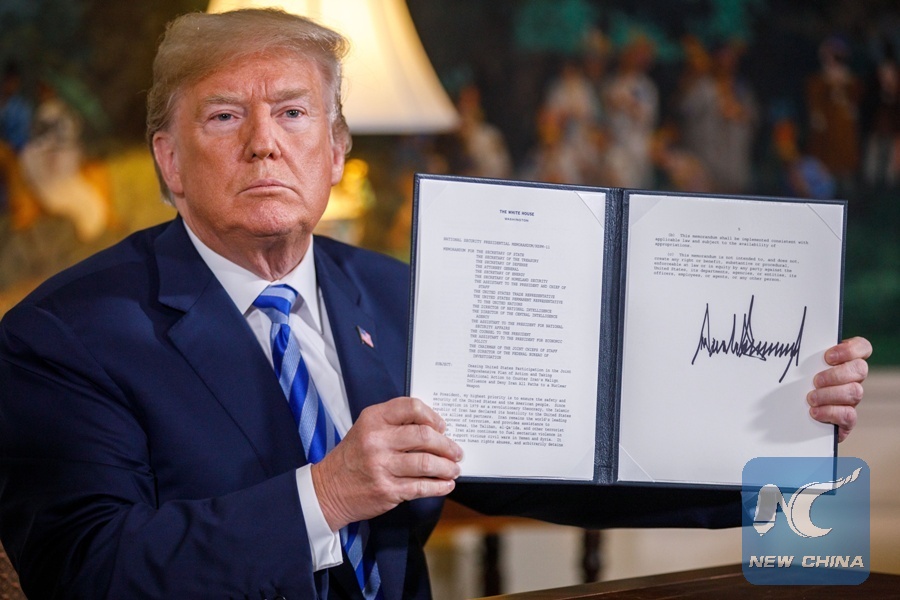
U.S. President Donald Trump displays a signed presidential memorandum at the White House in Washington D.C., the United States, on May 8, 2018. Trump said that the United States will withdraw from the Iran nuclear deal, a landmark agreement signed in 2015. (Xinhua/Ting Shen)
UNITED NATIONS, June 27 (Xinhua) -- Three years after its unanimous endorsement by the Security Council, the Iranian nuclear deal is "at a crossroads," the United Nations' top political official said on Wednesday.
The Joint Comprehensive Plan of Action (JCPOA), reached between Britain, China, France, Germany, Russia, the United States, the European Union (EU) and Iran in July 2015 to ensure Iran's nuclear program would be exclusively peaceful, is "at a crossroads" after Washington's decision to withdraw from the agreement, Rosemary DiCarlo, UN under-secretary-general for political affairs, said.
Addressing the 15-nation Security Council on Secretary-General Antonio Guterres' fifth report on the implementation of the council's resolution endorsing the JCPOA, DiCarlo said since the agreement came into force on Jan. 16, 2016, the International Atomic Energy Agency had consistently reported that Iran was abiding by its commitments.
She reiterated the secretary-general's regret at the United States' announcement as well as his call upon Iran to carefully consider the concerns of member states about activities allegedly contrary to the restrictions set out in the resolution.
DiCarlo said the secretariat had received information from two unidentified member states on the supply, sale, transfer or export to Iran of dual-use items that might be contrary to the resolution.
The report also included information from Israel and Iran on two Iranian missile launches in January 2018, the UN's recent assessment on Iranian ballistic missiles launched by Yemen's Houthi rebels into Saudi Arabia, and information from Israel regarding the possible presence of an Iranian drone in Syria, reportedly downed after entering Israeli airspace in February.
In the ensuing debate, delegates discussed annex B of the resolution, which contains provisions to improve transparency and create an atmosphere conducive to the full implementation of the JCPOA.
Jonathan Cohen, deputy permanent representative of the United States to the UN, said Iran continued to destabilize the Middle East through its support for terrorist groups and proxy forces. Calling on the Security Council to shine a spotlight on Iran's behavior, he said Tehran would face consequences for its actions.
Russian Ambassador to the UN Vassily Nebenzia was among the representatives who expressed regret over the U.S. withdrawal from the deal.
The U.S. decision had "damaged the non-proliferation regime, as well as security in the Middle East," Nebenzia said, calling the report lacking balance and reflecting unfounded accusations against Iran.
He expressed surprise at the document mentioning the U.S. decision only in passing.
Joao Pedro Vale de Almeida, head of the EU delegation to the UN, said preserving the Iran nuclear deal was "a key security interest for the bloc and the whole international community."
The full implementation of the agreement prevents a nuclear arms race in the region and "there is no positive alternative to the JCPOA, which is the fruit of more than 12 years of negotiation and a 104-page document endorsed at the highest level by the international community," he said.
As long as Iran implemented its nuclear obligations, the bloc would remain committed to the full and effective implementation of the deal, he said.
Christoph Heusgen, German ambassador to the United Nations, said the situation in the region and for European security had "taken a turn for the worse" following the U.S. withdrawal.
Exiting the JCPOA would "undermine effective multilateralism and the rules-based multilateral order," he said.
Chinese Ambassador to the UN Ma Zhaoxu described the JCPOA as an important multilateral achievement and a success story in addressing hot-spot issues through diplomatic means. The JCPOA had proven to be an effective agreement over three years, he said.
He called upon all parties to take a responsible attitude, consider the long term, commit to dialogue, and cooperate with patience in order to preserve the accord's authority.
China would continue to participate in the procurement working group, as it has consistently advocated resolution of the issue through diplomatic means, and would maintain dialogue with all parties concerned in implementing the JCPOA, Ma said.
On May 8, U.S. President Donald Trump decided to quit the landmark nuclear deal and vowed to reimpose sanctions, including oil embargo, on Tehran, triggering global criticism.

